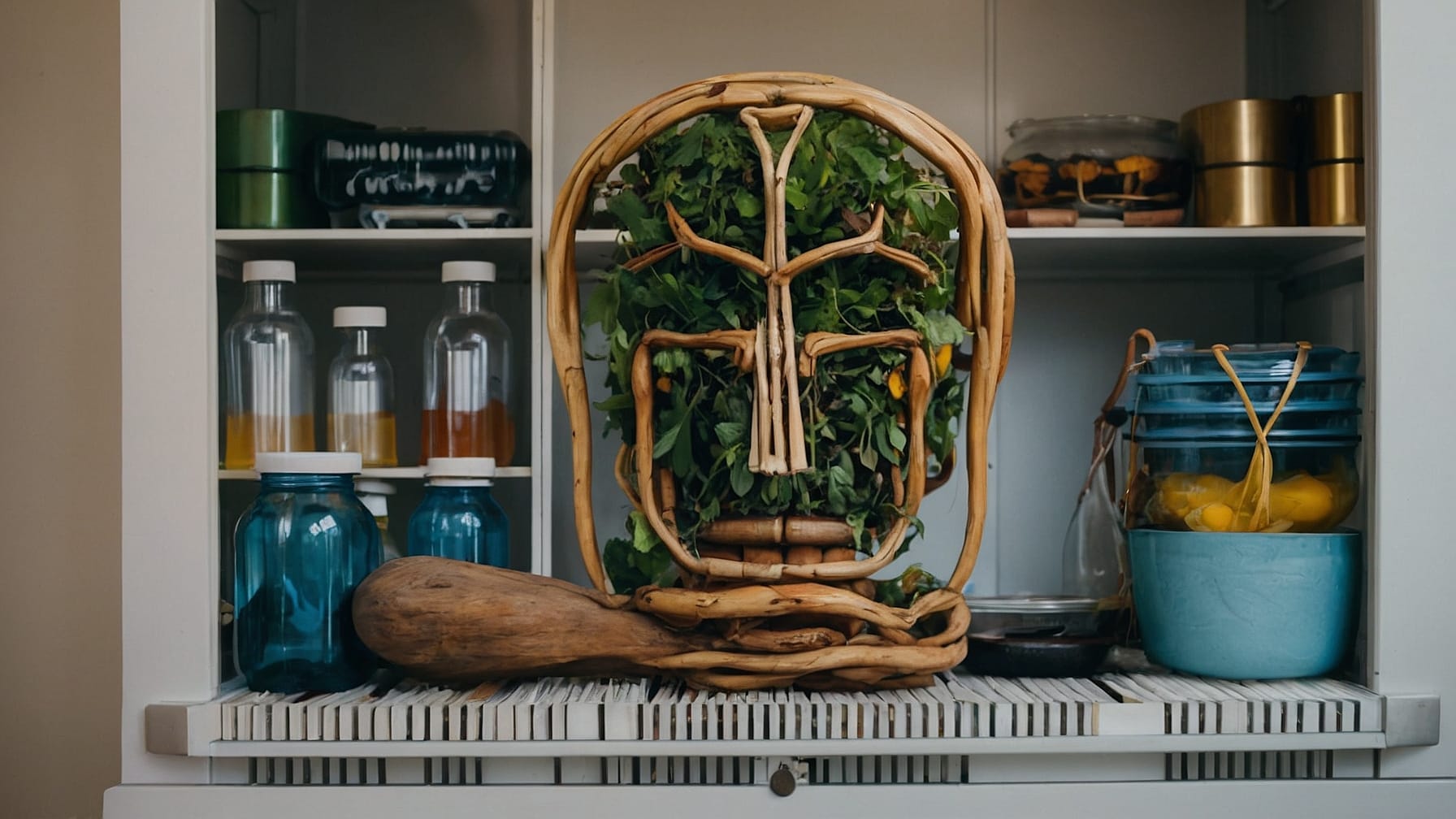Hi Vibrant community!, Olivia here, your ambassador for a vibrant and healthy lifestyle!
Today, we're discussing an important area that significantly impacts our overall well-being: mental health. We all know the importance of physical health, but sometimes, our emotional and psychological states need some extra TLC.
That's where functional medicine steps in! This approach goes beyond simply treating symptoms; it focuses on uncovering the root causes of mental health challenges. It's like being a detective, investigating the underlying factors that contribute to our emotional struggles.
Why Functional Medicine for Mental Health?

Traditional medicine often relies on medications to manage symptoms of depression, anxiety, and other mental health conditions. While medication can be incredibly helpful in many cases, sometimes it doesn't address the root cause. Functional medicine offers a holistic perspective, considering the intricate connection between our bodies and minds.
Here's what is exciting about functional medicine
- Individualized Approach: There's no "one-size-fits-all" solution in functional medicine. It recognizes that each person's experience is unique, and treatment plans are tailored to address your specific needs and underlying imbalances.
- Identifying Root Causes: Instead of just treating symptoms, functional medicine digs deeper to find the factors contributing to your mental health challenges. This could include nutritional deficiencies, hormonal imbalances, gut health issues, or chronic stress.
- Natural and Integrative Therapies: Functional medicine practitioners often utilize a variety of natural and integrative therapies to support mental well-being. Think of it like an orchestra, with each therapy playing a specific role to create a harmonious symphony of mental wellness.

Exploring the Functional Medicine Toolkit
So, what kind of tools might be included in a personalized functional medicine plan? Let's go over a breakdown of some exciting options:
| Therapy Area | Functional Medicine Approach |
|---|---|
| Nutritional Therapy | A functional medicine practitioner might assess your dietary habits and identify potential deficiencies that could be contributing to mental health challenges. For example, deficiencies in vitamin B12, folate, or iron can impact mood and energy levels. |
| Supplements | Certain vitamins, minerals, or herbal remedies might be recommended to address specific nutritional imbalances. It's important to remember that supplements should be taken under the guidance of a qualified healthcare professional. |
| Stress Management Techniques | Chronic stress is a major contributor to mental health issues. Functional medicine can introduce you to techniques like mindfulness meditation, deep breathing exercises, or yoga to help manage stress and promote relaxation. |
| Sleep Optimization | Sleep is vital for our mental and emotional well-being. A functional medicine practitioner might explore your sleep patterns and recommend strategies to improve sleep quality. |
| Hormonal Imbalance | Hormonal imbalances, especially those related to thyroid function and sex hormones, can significantly impact mood, energy levels, and overall well-being. Functional medicine practitioners may assess hormone levels and recommend appropriate dietary or lifestyle changes to support hormonal balance. |
| Therapy | Functional medicine doesn't replace traditional talk therapy. In fact, it can often complement it beautifully. Therapy can provide valuable tools for processing emotions and developing healthy coping mechanisms. |
Taking Your First Steps Towards Vibrant Mental Health

If you're curious about how functional medicine can support your mental well-being, here are some initial steps you can take:
- Do your research: Explore credible sources to learn more about functional medicine and the benefits it can offer for mental health.
- Find a qualified practitioner: Look for a licensed healthcare professional who specializes in functional medicine.
- Be open to exploring new possibilities: Remember, functional medicine is a journey of self-discovery. Embrace the process of finding what works best for you.

A Word on Integration and Collaboration
It's important to remember that functional medicine isn't a replacement for traditional mental healthcare. The ideal approach often involves collaboration between a functional medicine practitioner and a licensed therapist or psychiatrist.
Together, we can create a vibrant life, not just physically, but also mentally and emotionally.
This journey towards mental well-being is an exciting one. By taking a holistic and personalized approach through functional medicine, you can gain a deeper understanding of yourself and unlock the potential for a truly vibrant life.
Remember, you are not alone!

There are countless resources available to support your mental health journey. Here at Vibrant Body System, we offer a supportive community and a wealth of information to empower you on your path to well-being.
Have you explored functional medicine for mental health? Share your experiences and questions in the comments below!
Mental Health and Nutrition

I understand that proper nutrition is key to maintaining a healthy mind, as our dietary choices significantly affect our mental well-being. Implementing dietary interventions and understanding the role of specific nutrients can lead to enhanced mental health.

Impact of Diet on Mental Well-Being
Diet plays a crucial role in influencing mental health, with research suggesting that certain foods can either boost our mental wellness or contribute to anxiety and depression. I often emphasize the importance of antioxidants, vitamins, and minerals in the diet, as they are vital for cognitive function and mood stabilization. Research shared by The Institute for Functional Medicine affirms that increasing antioxidant-rich fruits and vegetables and reducing processed foods may help bolster mental wellness.

- Omega-3 fatty acids: Essential for brain health, these fats found in fish and flaxseeds can improve mood and cognitive function.
- B vitamins: Crucial in energy production and neurotransmitter synthesis, B vitamins found in whole grains and green leafy vegetables can influence feelings of well-being.
- Vitamins and minerals: From the vitamin D found in sunshine and fatty fish to magnesium in nuts and leafy greens, these micronutrients play a role in brain function and mood regulation.
Nutritional Deficiencies and Mental Health
My focus on nutritional status is because deficits in specific nutrients can manifest as mental health issues. For example, a lack of B vitamins can lead to cognitive problems and low mood. Omega-3 fatty acid deficiency has been linked to mood disorders, as these fatty acids are critical for brain structure and function. I guide my patients to get their nutritional status assessed and to include nutrient-dense foods in their diet as preventive or therapeutic dietary interventions.
- Fatty acid deficiency: A lack of omega-3s can contribute to depression and anxiety.
- Vitamin deficiencies: Low levels of vitamins, especially B12 and D, can be associated with poor mental health.
Living a Vibrant Life: Beyond the Doctor's Appointment
Functional medicine empowers you to take an active role in your mental well-being beyond just visiting a practitioner. Here are some lifestyle changes you can integrate into your daily routine to support your mental health journey.
| Habit | Description |
|---|---|
| Prioritize Sleep | Aim for 7-8 hours. Relaxing bedtime routine, consistent sleep schedule, dark & cool environment. |
| Nourish Your Body | Focus on whole, nutrient-rich foods for gut health & well-being. Minimize processed foods, added sugars, and unhealthy fats. |
| Move Your Body | Regular physical activity for stress management, mood boost, and sleep improvement. Find activities you enjoy (dancing, swimming, walking, fitness classes). |
| Connect with Others | Nurture relationships, build supportive community. Consider social groups or volunteering for causes you care about. |
| Practice Mindfulness | Utilize mindfulness techniques (meditation, deep breathing) to manage stress, reduce anxiety, and cultivate calm. Explore mindfulness apps and resources. |
| Spend Time in Nature | Immerse yourself in nature with regular walks in the park, gardening, or simply sitting outside to enjoy fresh air and sunshine. |
Remember, change takes time and requires consistent effort.
Be kind to yourself on this journey.
Celebrate your successes, big and small, and don't be discouraged by setbacks.

Functional medicine is a powerful tool for uncovering the root causes of mental health challenges and creating a personalized path to well-being. By integrating its principles with healthy lifestyle choices, you can unlock a vibrant life filled with mental clarity, emotional resilience, and a deep sense of peace.
I hope you enjoyed the article and the value I am trying to provide - if you have special requests or want to say HI, you know how to find me 🙋, till then stay Vibrant! 💕 💪🏼 🪞✨






